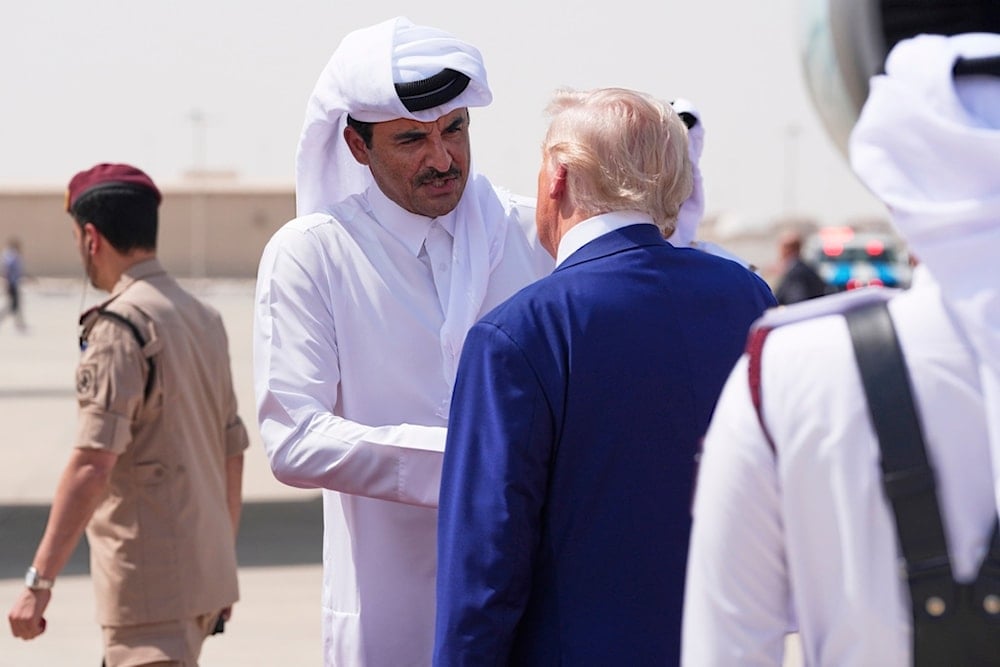Qatar warns UN: Israeli attack threatens regional security
Qatar tells the UN that the strike carried out by the Israeli regime on Doha threatens regional security, denies prior warning, and vows to defend its sovereignty after talks with Trump.
-

Qatar's Emir Sheikh Tamim bin Hamad Al Thani bids farewell to President Donald Trump at Al Udeid Air Base, Thursday, May 15, 2025, in Doha, Qatar. (AP)
Qatar has formally addressed the United Nations Security Council, warning that the recent Israeli occupation strike on its territory constitutes a grave incident that undermines regional security and demands immediate attention.
In its official message, Doha stressed that it “will not accept any action that threatens its security and sovereignty,” condemning what it described as "Israel’s" aggressive behavior and affirming it would not tolerate such acts.
The Foreign Ministry said the Israeli strike represented a dangerous escalation and reckless conduct threatening regional stability. It confirmed that investigations were ongoing “at the highest level” and that further details would be released once available.
Qatar rejects claims of prior warning
The ministry also dismissed reports that Qatar had been notified in advance of the attack. “The claim that Qatar was informed beforehand is incorrect,” it stated, clarifying that a call from a US official came only as the explosions from the strike were already unfolding.
Separately, the Amiri Diwan announced that Emir Sheikh Tamim bin Hamad Al Thani held a phone call with US President Donald Trump. During the conversation, the Emir affirmed that Doha would take “all necessary measures to protect its security and preserve its sovereignty.”
Israeli media revealed new details on the coordination between the Israeli occupation and the United States surrounding the recent strikes on the Qatari capital, Doha, which targeted Hamas leadership.
Channel 13 cited a senior Israeli official as saying that the attack was coordinated with Washington. The report highlights the extent of joint planning between the two allies in the lead-up to the operation.
Multiple meetings, daily communications
According to Channel 14’s correspondent, coordination included at least two key meetings in recent days. The first involved US Central Command chief Gen. Brad Cooper, who recently arrived in the occupied Palestinian territories and held his first meeting with Israeli Chief of Staff Eyal Zamir.
The two are said to maintain daily communications, sometimes more than once per day, focusing heavily on military coordination tied to the operation.
A second meeting reportedly took place within the last 24 hours between Israeli Minister of Strategic Affairs Ron Dermer and US envoy Steve Witkoff, further underlining the high-level engagement between the two sides.
Trump’s role in final buildup
The Channel 14 report added that the scenario unfolding over the past days was deliberately built toward the “climax” seen in the latest strikes. US President Donald Trump, the correspondent said, sought to directly position himself as responsible for the negotiation track, promoting a plan he presented just 48 hours earlier.
Trump’s public statements, through both social media and press appearances, framed the plan as Hamas’ “last chance,” adding warnings from Israeli military and political leaders that Hamas’ external leadership would “pay a price.”
According to the report, these remarks, alongside Prime Minister Benjamin Netanyahu’s and Security Minister Israel Katz's declarations, converged into the moment of escalation witnessed in Doha.

 3 Min Read
3 Min Read










